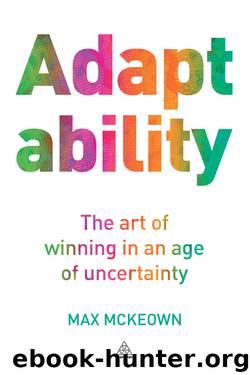Adaptability by Max McKeown

Author:Max McKeown
Language: eng
Format: epub
Publisher: Kogan Page Publishers
Rule
10
Think better together
Lysistrata is a comic play first performed in 411 BC in ancient Athens. Written by Aristophanes, it tells the story of the efforts of one woman to bring an end to a war being fought between Athens and Sparta. She convinces women throughout Greece to withhold sex from all men for as long as the fight continues.
In the play, men from both sides become desperate for sex and agree to peace talks. Lysistrata introduces them to a beautiful young woman named Reconciliation. The thought of her, symbolic of all that is good about peace, encourages delegations to settle their arguments. There is peace at last, and rowdy celebrations begin in the Acropolis.
The main character in the play is fictitious, although the war was real without an easy or rapid end. It lasted for 25 years during which an ending probably seemed impossible. After the play was first performed, another seven years of war followed, ending in the partial end of democracy and reduction in Athenian prominence.
In September 2006, a group of wives and girlfriends of gangsters in the town of Pereira, Colombia announced a sex-strike to encourage the ending of violence. Called the ‘strike of crossed legs’ it succeeded in sending the message that killing was not sexually attractive and resulted in a 26.5 per cent decline in murders. In April 2009 a group of Kenyan women organized a week-long sex-strike; they encouraged the wives of politicians to support them and even offered to pay prostitutes for lost earnings.
But by far the most dramatic of the sex-strikes was in Liberia where Leymah Gbowee organized a series of mass non-violent protests. The non-obvious adaptation of Liberian women to their 14-year civil war succeeded in establishing peace. By 2005, their campaign also helped elect their new president, Ellen Johnson Sirleaf, the first female president on the African continent. Both women received the Nobel Peace Prize.
By 2002 more than a quarter of a million people had been killed in Liberia. That’s the year Leymah Gbowee decided that changes would have to come from the mothers. She had spent years working with ex-child soldiers as a trauma counsellor and social worker. It was this experience that helped her find a non-obvious answer to protests against the war.
It would be the women who changed the rules of the game. The women who started singing together in a fish market in the capital. Women were unhappy with their children dying in the conflict. Women pressured Charles Taylor, dictator, to start peace talks. Women marched into the hotel where negotiations had stalled. And it was women who dared the negotiators to sign a comprehensive peace treaty with a new government.
The significance of the Liberian story is that the dictator was out-thought and out-adapted by the women’s movement. They brought Christians and Muslims together, something the government couldn’t do. Through non-violence, including the sex-strike, they made their voices heard. They recognized that adaptation was necessary, understood what that needed to be, and were better organized than the various warring factions.
Download
This site does not store any files on its server. We only index and link to content provided by other sites. Please contact the content providers to delete copyright contents if any and email us, we'll remove relevant links or contents immediately.
The Compound Effect by Darren Hardy(8969)
Tools of Titans by Timothy Ferriss(8396)
Nudge - Improving Decisions about Health, Wealth, and Happiness by Thaler Sunstein(7709)
Win Bigly by Scott Adams(7199)
Deep Work by Cal Newport(7085)
Rich Dad Poor Dad by Robert T. Kiyosaki(6633)
Principles: Life and Work by Ray Dalio(6449)
Pioneering Portfolio Management by David F. Swensen(6301)
Digital Minimalism by Cal Newport;(5765)
The Barefoot Investor by Scott Pape(5745)
Grit by Angela Duckworth(5615)
The Slight Edge by Jeff Olson(5418)
Discipline Equals Freedom by Jocko Willink(5390)
The Motivation Myth by Jeff Haden(5213)
You Are a Badass at Making Money by Jen Sincero(4930)
The Four Tendencies by Gretchen Rubin(4604)
Eat That Frog! by Brian Tracy(4541)
The Confidence Code by Katty Kay(4262)
Bullshit Jobs by David Graeber(4192)
